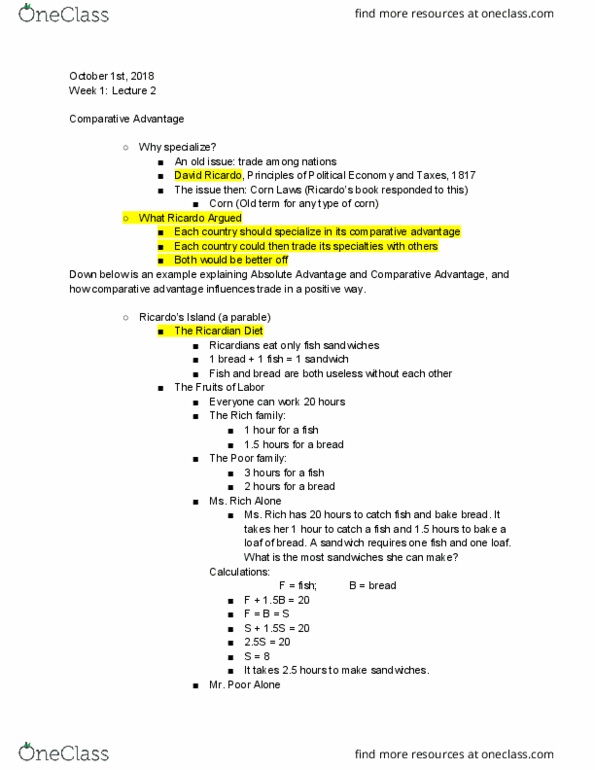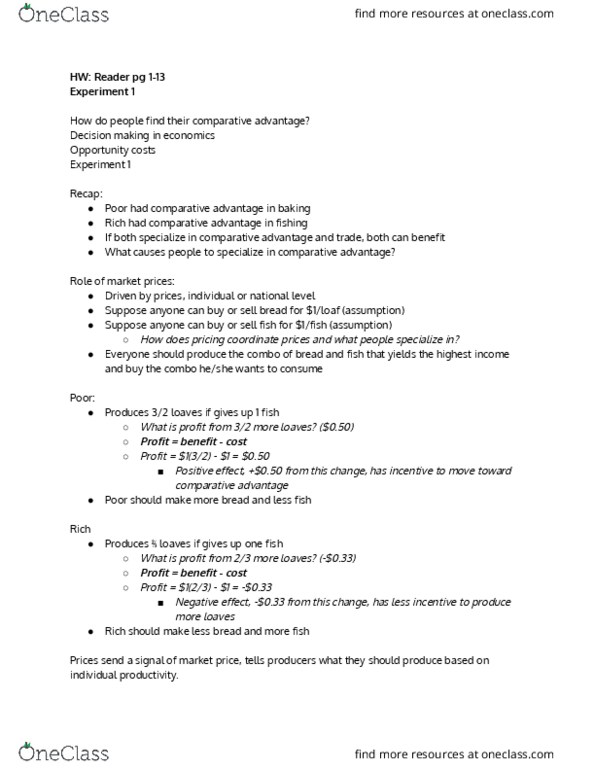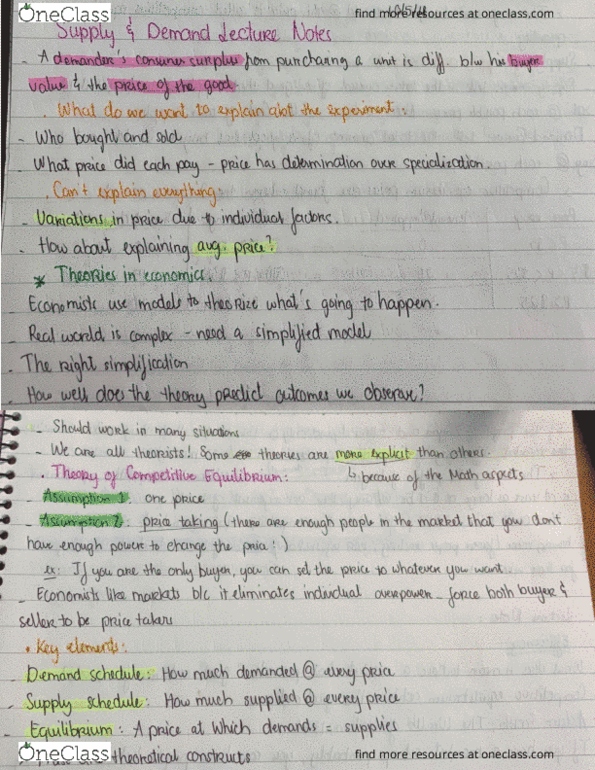ECON 1 Lecture Notes - Lecture 3: Standard-Definition Television, Ebay, Starbucks
Document Summary
Get access


Related Documents
Related Questions
The opportunity cost of one more slice of pizza in terms of sodas is the
|
the total number of pizza slices that we have divided by the total number of sodas that we have. |
||
|
the number of sodas we have to give up to get one extra pizza slice. |
||
|
the number of pizza slices we have to give up to get one extra soda. |
||
|
the total number of sodas that we have divided by the total number of pizza slices that we have. |
1 point
QUESTION 2
A production possibilities frontier shows
|
how money can be allocated among two kinds of goods. |
||
|
the limits to the future growth of a nation. |
||
|
the various combinations of output a nation can produce at a certain time, given its available resources and technology. |
||
|
that if the price of one good decreases, the price of the other has to increase. |
1 point
QUESTION 3
When a production possibilities frontier is bowed outward, as more of one good is produced, its opportunity cost
|
remains constant. |
||
|
might increase, decrease, or remain constant depending on how much people value the additional units of the good. |
||
|
increases. |
||
|
decreases. |
1 point
QUESTION 4
When all of the available factors of production are being efficiently employed, the
|
the economy is producing at a point within its PPF. |
||
|
PPF disappears. |
||
|
the economy is producing at a point beyond its PPF. |
||
|
the economy is producing at a point on its PPF. |
1 point
QUESTION 5
If a nation devotes a larger share of its current production to consumer goods, then
|
its PPF will shift inward. |
||
|
its economic growth will slow down. |
||
|
its PPF will shift outward. |
||
|
some productive factors will become unemployed. |
1 point
QUESTION 6
A point on the production possibilities frontier reflects an
|
the attainable point with full employment of all resources. |
||
|
attainable point without full employment of all resources. |
||
|
unattainable point without full employment of all resources. |
||
|
the unattainable point with full employment of all resources. |
1 point
QUESTION 7
When drawing a production possibilities frontier, which of the following is held constant?
|
the available factors of production and the state of technology |
||
|
the amount of money in the economy |
||
|
the prices of goods and services |
||
|
the quantity of the goods and services that are produced |
1 point
QUESTION 8
As we move along the production possibilities frontier,
|
more of both goods can be produced. |
||
|
the possibilities of tradeoffs diminish. |
||
|
a tradeoff is not possible because nations need all goods. |
||
|
the production of one good increases as the production of the other good decreases. |
1 point
QUESTION 9
Which of the following is an assumption used when drawing a production possibilities frontier?
i.Human wants and desires are limited to what is available.
ii. Only two goods are considered.
iii. The level of technology is fixed and unchanging.
|
I and iii |
||
|
ii only |
||
|
I, ii, and iii |
||
|
I only |
1 point
QUESTION 10
To achieve gains from trade, a country
|
needs to have an absolute advantage in the production of all goods. |
||
|
specializes in producing a good in which it has a lower opportunity cost. |
||
|
must produce at a point beyond its PPF. |
||
|
should produce at the midpoint of its PPF. |
1 point
QUESTION 11
Relative to Al, Joe has ________ if Joe can produce a good at a lower opportunity cost than Al.
|
a comparative advantage |
||
|
more production efficiency |
||
|
a marginal benefit |
||
|
a comparative benefit |
1 point
QUESTION 12
Does economic growth depend upon which of the following?
i.Improving the quality of labor
ii. Technological advancement
iii. Increasing the amount of capital
|
iii only |
||
|
ii only |
||
|
I only |
||
|
I, ii, and iii |
1 point
QUESTION 13
In one hour John can produce 20 loaves of bread or 18 cakes. In one hour Phyllis can produce 30 loaves of bread or 15 cakes. Which of the following statements is true?
|
John has a comparative advantage in producing cakes. |
||
|
Phyllis has an absolute advantage in both goods. |
||
|
Phyllis has a comparative advantage in producing cakes. |
||
|
John has an absolute advantage in both goods. |
1 point
QUESTION 14
As an economy produces more of one of the goods on a bowed out production possibilities frontier, what happens to the opportunity cost of producing the good?
|
It decreases. |
||
|
It might increase, decrease, or remain constant depending on how much people value the additional units of the good. |
||
|
It remains constant. |
||
|
It increases. |
1 point
QUESTION 15
The production possibilities frontier illustrates the
|
goods and services that people want. |
||
|
maximum combinations of goods and services that can be produced. |
||
|
resources the economy possesses, but not it is the level of technology. |
||
|
limits to people's wants. |
1 point
QUESTION 16
The United States produced approximately ________ worth of goods and services in 2007.
|
$14 billion |
||
|
$14 trillion |
||
|
$140 billion |
||
|
$140 trillion |
1 point
QUESTION 17
The fact of increasing opportunity cost when moving on the PPF means that
|
to increase the production of one product requires smaller and smaller sacrifices of the other good. |
||
|
to decrease the production of one product requires smaller and smaller sacrifices of the other good. |
||
|
to increase the production of one product requires larger and larger sacrifices of the other good. |
||
|
when the government forces a movement from one point on the PPF to another point, no production is lost. |
1 point
QUESTION 18
Other things equal, if India devotes more resources to educate its population than China,
|
China will grow faster than India. |
||
|
India will be able to eliminate scarcity faster than China. |
||
|
India will be able to eliminate opportunity cost faster than China. |
||
|
India will grow faster than China. |
1 point
QUESTION 19
For Ireland to grow more potatoes, wool production must decrease. This situation is an example of
|
zero opportunity cost. |
||
|
producing at a point that lies beyond the PPF. |
||
|
opportunity benefit. |
||
|
a tradeoff. |
1 point
QUESTION 20
Moving from one point to another on a production possibilities frontier implies
|
increasing the production of both goods. |
||
|
increasing the production of one good and decreasing the production of another. |
||
|
holding the production levels of both goods constant. |
||
|
decreasing the production of both goods. |
1 point
QUESTION 21
The United States is one of the richest nations in the world,
|
but it can still benefit from specialization and trade. |
||
|
so does not need to trade with poor nations to achieve any gains from trade. |
||
|
so might not have a comparative advantage in producing any goods. |
||
|
so it must have a comparative advantage in the production of all goods. |
1 point
QUESTION 22
"Comparative advantage" is defined as a situation in which one person can produce
|
more of all goods than another person. |
||
|
a good for a lower opportunity cost than another person. |
||
|
a good for a lower dollar cost than another person. |
||
|
more of a good than another person. |
1 point
QUESTION 23
The idea of increasing opportunity cost is reflected in the
|
the linear shape of the production possibilities frontier. |
||
|
bowed in the shape of the production possibilities frontier. |
||
|
bowed out the shape of the production possibilities frontier. |
||
|
the positive slope of the production possibilities frontier. |
1 point
QUESTION 24
Suppose that after specializing according to comparative advantage, a country is trading with another nation that also specializes according to its comparative advantage. Which of the following statements are true for the first country?
i)It enjoys gains from trade.
ii)It must have an absolute advantage in the production of the good it produces.
iii)It is producing at a point beyond its PPF.
|
I only. |
||
|
I and ii. |
||
|
I and iii. |
||
|
ii and iii. |
1 point
QUESTION 25
If society moves from a period of time with significant unemployment to a time with full employment, its production possibilities frontier will
|
shift rightward. |
||
|
not shift because the society moves from one point on the frontier to a point inside the frontier. |
||
|
not shift because the society moves from a point inside the frontier to a point on the frontier. |
||
|
shift leftward. |
1 point
1) Suppose your grandmother gave you $25 for your birthday and you decided to spend all of it on candy bars and bags of popcorn. The price of candy bars is $1.25 and price of a bag of peanuts is $3.75.
a) Construct a table showing the alternative combinations of the two products that are available.
b) Plot the data in your table as a budget line in a graph. What is the slope of the budget line? What is the opportunity cost of one more candy bar? Of one bag of peanuts?
c) How, in general, would you decide which of the available combinations of candy bars and bags of peanuts to buy?
2) With current technology, suppose a firm is producing 750 screwdrivers daily. Also assume that the least-cost combination of resources in producing those screwdrivers is 15 units of labor, 20 units of land, 4 units of capital, and 3 unit of entrepreneurial ability, selling at prices of $50, $45, $75, and $50, respectively. If the firm can sell these 750 screwdrivers at $2.50 per unit,
a) what is its total revenue?
b) what is its total cost?
c) what is its profit or loss?
d) will it continue to produce screwdrivers?
e) If this firmâs situation is typical for the other makers of screwdrivers, will resources flow toward or away from this product?
3) How will each of the following changes in demand and/or supply affect equilibrium price and equilibrium quantity in a competitive market; that is, do equilibirium price and quantity rise, fall , or are the answers indeterminate because they depend on the magnitudes of the shifts?
a)Supply decreases and demand is constant. Change in eqilibrium price chnage in eqilibrium quantity
b)Demand decreases and supply is constant.
c)Supply increases and demand is constant.
d)Demand increases and supply increases.
e)Demand decreases and supply decreases.
4)Zeke likes to go to music concerts. The number of times per year that he attends concerts depends on both the price of the concerts as well as Zekeâs income and the cost of other types of entertainmentâin particular, how much it costs to go see a movie instead of attending concerts. The three demand schedules in the $60,000 per year and movies cost $10 each. In scenario D2, Zeke's income is also $60,000 per year, but the price of seeing a movie rises to $12. And in scenario D3, Zeke's income goes up to $80,000 per year, while movies cost $12.
a)Using the data under D1 and D2, calculate the cross-elasticity of Zeke's demand for concerts at all three prices. (To do this, apply the midpoints approach to the cross-elasticity of demand.) Is the cross-elasticity the same at all three prices? Are movies and concerts substitute goods, complementary goods, or independent goods?
b)Using the data under D2 and D3, calculate the income elasticity of Zeke's demand for concerts at all three prices. (To do this, apply the midpoints approach to the income elasticity of demand.) Is the income elasticity the same at all three prices? Are concerts an inferior good?
| PRICE | D1 | D2 | D3 |
| 50 | 10 | 5 | 12 |
| 40 | 15 | 10 | 25 |
| 30 | 25 | 15 | 40 |
Income 60,000 60,000 80,000
Cost of revenue 10 12 12
5) On the basis of the three individual demand schedules below, and assuming these three people are the only ones in the society, determine (a) the market (a) the market demand schedule on the assumption that the good is a private good and (b) the collective demand schedule on the assumption that the good is a public good.
| P | Qd(D1) | Qd(D2) | Qd(d3) |
| 20 | 0 | 0 | 1 |
| 19 | 0 | 1 | 2 |
| 17 | 0 | 2 | 3 |
| 16 | 0 | 3 | 4 |
| 15 | 1 | 4 | 5 |
| 14 | 2 | 5 | 6 |
| 13 | 3 | 6 | 7 |
| 12 | 4 | 7 | 8 |
| 11 | 5 | 8 | 9 |
| 10 | 6 | 9 | 10 |



